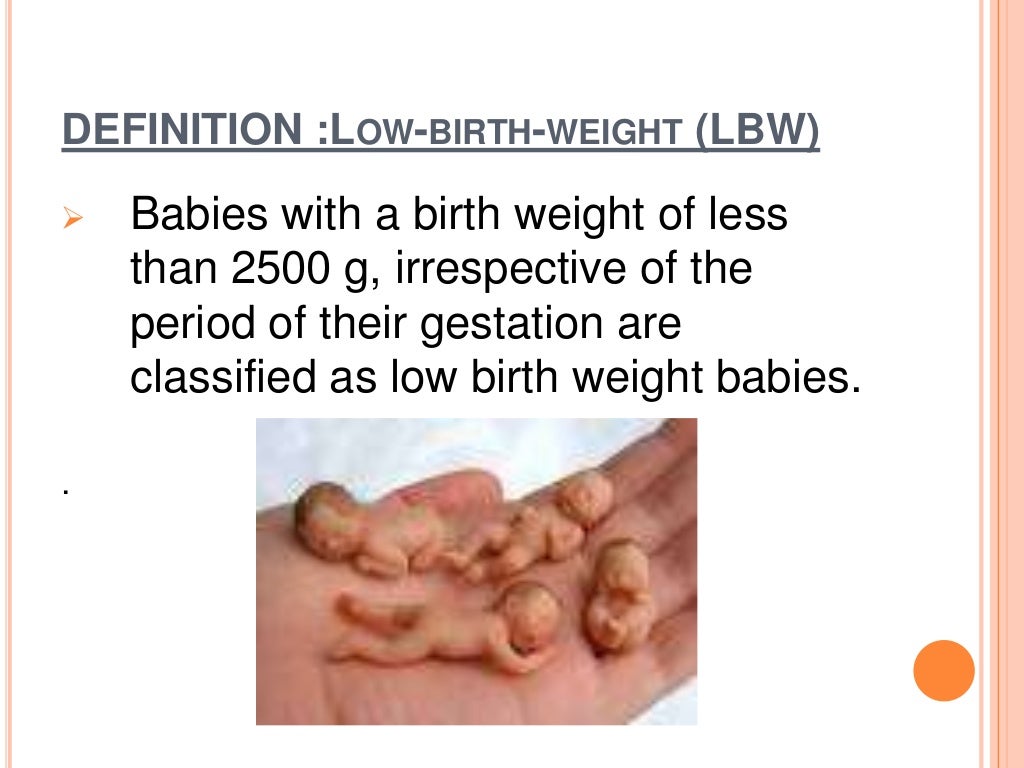Introduction:
Caring for a low birth weight (LBW) baby can be an emotionally and physically demanding task. These infants are born weighing less than 2500 grams and are at greater risk of health complications and developmental challenges. The nursing management of LBW babies requires specialized knowledge, skills, and a holistic approach to ensure optimal outcomes.

Image: www.slideshare.net
This guide explores the critical aspects of nursing management for LBW babies, including assessment, interventions, and monitoring. By understanding the unique needs of these vulnerable newborns, nurses play a vital role in promoting their health, growth, and long-term well-being.
Understanding Low Birth Weight:
LBW is categorized based on the infant’s weight at birth:
- Very Low Birth Weight (VLBW): Less than 1500 grams.
- Extremely Low Birth Weight (ELBW): Less than 1000 grams.
- Low Birth Weight (LBW): 1500-2499 grams.
Multiple factors can contribute to LBW, including maternal health conditions (e.g., gestational diabetes, preeclampsia), multiple births, and intrauterine growth restriction. The severity of the baby’s condition and any potential long-term effects will depend on the degree of LBW.
Nursing Assessment:
Thorough and ongoing assessment is crucial to monitor the LBW baby’s progress and identify any potential complications. Nurses should assess:
- Vital signs:
- Neurological status:
- Physiological appearance:
- Nutritional status:
Respiratory rate, heart rate, oxygen saturation, body temperature.
Movement, tone, reflexes.
Skin color, body shape, respiratory effort.
Feeding tolerance, weight gain.
Regular monitoring is essential to detect any early signs of deterioration and initiate prompt interventions.
Interventions:
Nursing interventions for LBW babies aim to support their development, prevent complications, and promote a safe and nurturing environment. Key interventions include:
- Thermoregulation: LBW babies have difficulty maintaining body temperature. Skin-to-skin care, incubator use, and warm blankets are essential to prevent hypothermia.
- Respiratory Support: These infants may experience respiratory distress syndrome (RDS) due to underdeveloped lungs. Oxygen therapy, CPAP, and mechanical ventilation may be needed.
- Nutritional Support: Exclusive breastfeeding provides the optimal nutrition for LBW babies. However, they may require supplemental feedings (e.g., formula, IV fluids) due to their limited stomach capacity.
- Infection Prevention: LBW babies are prone to infections due to an immature immune system. Strict adherence to isolation precautions, hand hygiene, and sterile technique is crucial.

Image: www.slideshare.net
Monitoring and Evaluation:
Close monitoring of the LBW baby’s response to interventions is essential. Nurses should track:
- Vital signs and respiratory status.
- Growth and weight gain.
- Feeding tolerance and nutritional intake.
- Any signs of infection or complications.
Regular evaluations help the healthcare team adjust interventions and track the baby’s progress. Nurses play a vital role in communicating observations, monitoring trends, and advocating for appropriate care.
Enhancing Family-Centered Care:
LBW infants often require extended hospital stays, impacting the family significantly. Nurses should prioritize family-centered care by:
- Providing education and support to parents.
- Facilitating communication between healthcare providers and the family.
- Supporting kangaroo care and skin-to-skin bonding.
- Encouraging parental involvement in the baby’s care.
By nurturing strong family connections, nurses create a supportive environment for LBW babies to thrive.
Nursing Management Of Low Birth Weight Baby
Conclusion:
Nursing management of LBW babies requires a multidisciplinary approach, involving medical expertise, nursing knowledge, and compassionate care. By understanding the unique needs of these vulnerable infants, nurses play a pivotal role in promoting their well-being and optimizing their developmental outcomes. Through ongoing assessment, timely interventions, and collaborative partnerships with families, nurses make a profound impact on the lives of LBW babies and their families, fostering a brighter and healthier future.